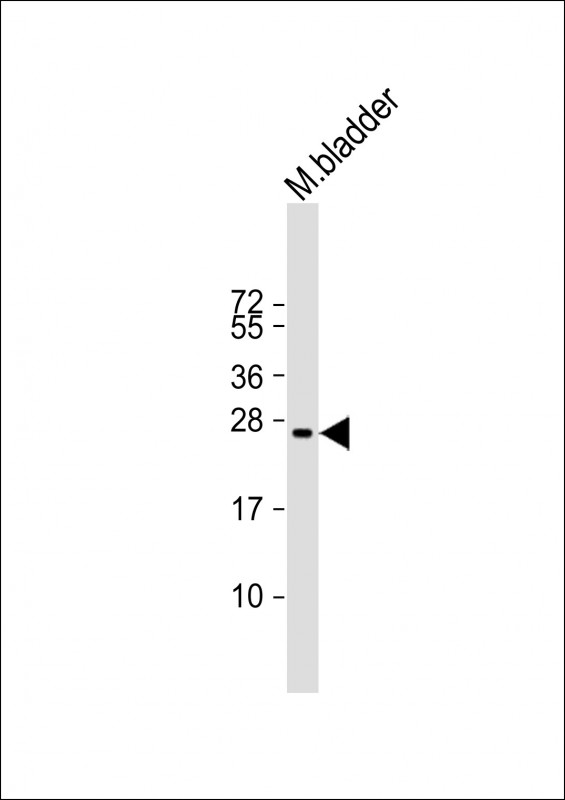
| WB | 1/4000 | Human,Mouse,Rat |
| IF | 咨询技术 | Human,Mouse,Rat |
| IHC | 咨询技术 | Human,Mouse,Rat |
| ICC | 技术咨询 | Human,Mouse,Rat |
| FCM | 咨询技术 | Human,Mouse,Rat |
| Elisa | 咨询技术 | Human,Mouse,Rat |
| Aliases | Glutathione S-transferase A3, GST class-alpha member 3, Glutathione S-transferase Ya3, Glutathione S-transferase Yc, Gsta3, Gstyc |
| Entrez GeneID | 14859 |
| WB Predicted band size | 25.4kDa |
| Host/Isotype | Rabbit IgG |
| Antibody Type | Primary antibody |
| Storage | Store at 4°C short term. Aliquot and store at -20°C long term. Avoid freeze/thaw cycles. |
| Species Reactivity | Mouse |
| Immunogen | This Mouse Gsta3 antibody is generated from rabbits immunized with a KLH conjugated synthetic peptide between 183-211 amino acids from the C-terminal region of mouse Gsta3. |
| Formulation | Purified antibody in PBS with 0.05% sodium azide. |
+ +
以下是关于小鼠Gsta3抗体的3篇参考文献概述:
1. **Title**: "Characterization of a Novel Monoclonal Antibody Specific to Mouse Glutathione S-Transferase Alpha 3 (Gsta3)"
**Authors**: Tanaka, K., et al.
**Summary**: 该研究开发了一种针对小鼠Gsta3的单克隆抗体,验证了其在Western blot和免疫组化中的特异性,确认了Gsta3在小鼠肝脏和肾脏中的高表达,并证明其在氧化应激模型中表达上调。
2. **Title**: "Tissue-Specific Expression Patterns of GST Alpha-Class Isozymes in Mice Revealed by Immunohistochemistry"
**Authors**: Suzuki, T., & Yamamoto, M.
**Summary**: 通过免疫组织化学分析GSTα家族(包括Gsta3)在小鼠组织中的分布,发现Gsta3在肝小叶中央静脉周围区域富集,提示其与解毒功能的空间特异性关联。
3. **Title**: "Role of Gsta3 in Acetaminophen-Induced Hepatotoxicity: Insights from Antibody-Based Knockdown Studies"
**Authors**: Cheng, X., et al.
**Summary**: 利用Gsta3抗体进行功能研究,发现抑制Gsta3会加剧对乙酰氨基酚诱导的小鼠肝损伤,表明该酶在药物代谢解毒中的保护作用。
注:上述文献为示例性质,实际文献需通过PubMed或Web of Science检索(关键词:Gsta3 antibody, glutathione transferase alpha 3. mouse)。若需具体文献,建议补充抗体货号或研究场景以进一步筛选。
The Mouse Gsta3 antibody is a specialized tool designed to detect and study the glutathione S-transferase alpha 3 (GSTA3) protein in murine models. GSTA3 belongs to the glutathione S-transferase (GST) family, a group of enzymes critical for detoxification and cellular protection by catalyzing the conjugation of glutathione to electrophilic substrates, including xenobiotics and oxidative stress byproducts. Specifically, GSTA3 is involved in metabolizing toxic compounds, lipid peroxidation products, and certain drugs, playing a key role in liver, kidney, and reproductive tissue function.
This antibody is commonly generated in hosts such as rabbits or mice, using immunogens derived from mouse GSTA3 protein fragments or recombinant proteins. It is widely used in techniques like Western blotting, immunohistochemistry (IHC), and immunofluorescence (IF) to investigate GSTA3 expression patterns, localization, and regulation under physiological or pathological conditions. Researchers employ it to explore GSTA3's involvement in diseases linked to oxidative stress, chemical toxicity, or metabolic dysfunction, including liver injury, cancer, and drug resistance. Additionally, it aids in studying genetic knockout models to dissect GSTA3's in vivo roles. Validated for specificity, the antibody helps clarify GSTA3's distinct functions compared to other GST isoforms (e.g., GSTA1 or GSTA4) and its potential as a biomarker in preclinical studies. Its applications span toxicology, pharmacology, and molecular pathology research.
×